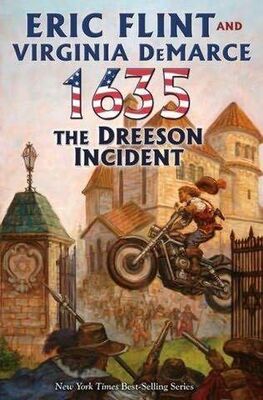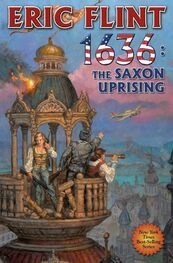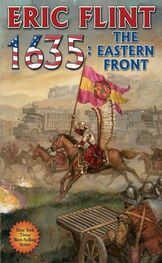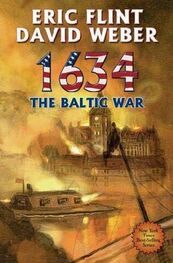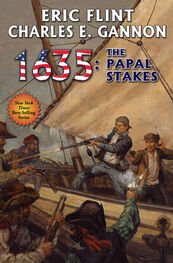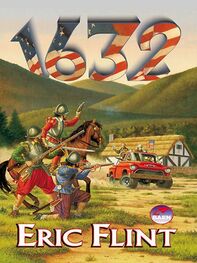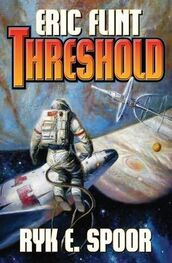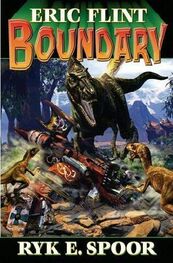One thing was clear. Anti-Semitism had always played an important role in European politics, but the phenomenon could be quirkier than it looked. Francisco had been quite fascinated to discover, for instance, that during the Holocaust the two safest places for a Jew in those parts of Europe under the Nazis had been Italy and Bulgaria-both of which had fascist governments themselves.
He still didn't know the reasons for that, beyond the fact itself, in the case of Bulgaria. Grantville's records concerning Bulgarian history were essentially non-existent, and even that seemingly endless fount of historical knowledge Melissa Mailey had admitted she knew hardly anything on the subject.
But Grantville's records on Italian history were quite good. Not surprisingly, given the high percentage of its inhabitants who came from Italian stock. And the logic in the case of Italy was quite clear, once you knew where to look.
In Germany, anti-Semitism had become a tool of the emerging nationalist movement and became an integral part of it. One of the early nationalist leader Father Jahn's complaints against the foreign tyrant Napoleon had been that the French bastard prevented the Germans from indulging in their ancient custom of pogroms.
The logic developed in an opposite manner, in Italy. There, anti-Semitism was seen as a tool of the papacy-and it was the papacy and the papal states who were the principal internal obstacles to Italian unification. As it emerged, therefore, Italian nationalism was deeply hostile to anti-Semitism. Where Germany's Father Jahn had stirred up anti-Semitism, one of the first acts of the revolutionists in the great 1848 revolution in Rome had been to tear down the walls of the ghetto.
So. Who was to say that the rise of German nationalism in this universe couldn't develop in a nicely Latin manner?
Not Francisco Nasi. Who was, after all, himself a Jew.
He began humming a tune.
"Catchy," commented Achterhof. "What is it?"
"Oh, it's an up-time melody. Composed by a fellow named Verdi."
And then, of course, there was the second reason. Whatever doubts Francisco might have had were simply overwhelmed by the delightful possibility that opened up in the course of the final discussion between himself and Stearns and the CoC leaders.
"We need a name for this operation," Gretchen had said at one point. "Something striking and memorable."
Mike scratched his chin, thoughtfully.
It came to Francisco, in a flash. And by the sudden change of expression on Stearns' face, to him as well. They exchanged glances, and much as the poet said:
Looked at each other with a wild surmise -
Silent, upon a peak in Darien.
"I have it," said Francisco. "You should call it 'Operation Krystalnacht.' "
"Absolutely," said Mike.
Gretchen and Gunther and Spartacus rolled the name around.
"Krystalnacht," mused Achterhof. "I like it. It's catchy and memorable. 'Crystal Night.' It doesn't make any sense, but I like it."
"Krystalnacht' it is, then," said Gretchen.
Later, when the two of them were alone, Mike shook his head. "I can't believe we did that."
"Don't be silly," said Francisco. "It's perfect."
Kassel
The first thing Landgrave William did upon his return to his capital city was summon his military commanders.
"Here," he said. He placed a small sheaf of papers on the table in the salon where they'd gathered. "I want every man named here-every member of every organization named here-arrested immediately. And I don't care what level of force you need to use to bring them in. Dead is fine. I'll have a fair number of them executed anyway."
One of the officers picked up the list and studied it. By the time he got to the third sheet, his eyebrows were lifted.
"If you don't mind me asking, Your Grace, where did you get this list?"
"It was handed to me on the border of the province, as we passed across," William said grimly, "by the commander of a large force of the Committees of Correspondence. A large and well-armed force. The same flintlocks provided for the federal army-and better guns than most of our own soldiers have. They seem quite well disciplined, too."
The officer's eyebrows lifted still further.
"Just do it, colonel. I don't need to see anti-Semites and witch-hunters hanging from gibbets in Hesse-Kassel, or lying by the road where they were shot by firing squads. I saw quite enough of that already on our way here from Magdeburg. The best way to keep out the CoCs is to make them unnecessary."
He sat down heavily in a chair by the table. "I'm sick of those bastards anyway."
"Stinking CoCs," agreed the colonel.
"Not them," said the landgrave. "The anti-Semites. The witch-hunters. As if we didn't have enough trouble!"
The worst bloodshed was in Mecklenburg. The nobility in that province was still solidly in place, and it had long been the most grasping, piggish and narrow-minded in the Germanies. The reason for the Fourth of July Party's popularity in that largely rural province was due to the aristocracy's greed, in fact. The peasantry hated them.
The Mecklenburg nobility actually had very few ties to anti-Semitism. They were an impoverished, hardscrabble sort of aristocracy. Really, more in the way of what in England would have been considered country squires or, at a later period in Russian history, the class of rich peasants known as "kulaks." There just wasn't a lot of blood to be squeezed out of the turnip of north German agriculture-which meant the aristocracy squeezed very hard. But it also meant they tended to rely on the Jewish populations in the towns for a number of needed services. It was actually among the peasantry that anti-Semitism had traditionally been most deeply rooted.
But, as often happens, social customs were trumped by politics. Everyone in the Germanies except village idiots understood perfectly well that the Committees of Correspondence, in Operation Krystalnacht, were using the anti-Semites and witch-hunters as scapegoats-in another of history's little ironies. When one of their columns marched into a town and rounded up known anti-Semitic agitators or known witch-hunters and summarily executed them after a summary trial, what they were really doing was baring their teeth at the establishment while, simultaneously, making clear to their own supporters what was henceforth to be acceptable or unacceptable conduct. Directly, they didn't threaten the noblemen or the city patricians or the guildmasters, no. Achterhof's orders on that subject had been crystal clear and fairly blood-curdling as to the consequences if they were disobeyed.
But who was fooled, really? Hardly no one. So, often enough, the CoC columns were cheered as they marched through a town by the same lower classes of people who, for generations, had actually provided most of the members of lynch mobs. And were glowered upon, from their shelters behind fancy windows, by people of the upper classes who were in fact often quite guiltless of persecuting Jews or hunting witches. It just didn't matter. The CoC leaders had ordered Krystalnacht as a combined mass education for their own followers and form of intimidation toward their enemies. That was the essence of it, not the several thousand anti-Semites and witch-hunters across the USE's provinces and imperial cities who wound up being killed in the process.
In every other province, even Pomerania, the nobility as a whole was shrewd enough to step aside and let the CoC columns do their work. Except those of them who were directly part of one or another anti-Semitic organization on the CoC lists, of course. But most noblemen were not. Almost none, in some provinces.
Mecklenburg was the exception. There, the pigheaded nobility rose to the bait. They didn't care in the least about the anti-Semites being shot by the CoC columns. They were simply by-damn and by-golly not about to tolerate the CoCs operating openly in their territory.
Читать дальше